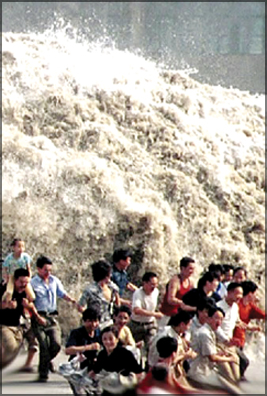|
-new-navin-2.jpg)

 Two
seismic stations are expected to be established in Sri Lanka under a
tripartite (three-party) cooperation agreement between the Environment
and Natural Resources Ministry, Disaster Management and Human Rights
Ministry and Helmholtz Centre, Postdam (GFZ - German Research Centre for
Geosciences). Cabinet approval has already been granted to the
memorandum in this regard, submitted by Environment and Natural
Resources Minister Patali Champika Ranawaka and Disaster Management and
Human Rights Minister Mahinda Samarasinghe. Two
seismic stations are expected to be established in Sri Lanka under a
tripartite (three-party) cooperation agreement between the Environment
and Natural Resources Ministry, Disaster Management and Human Rights
Ministry and Helmholtz Centre, Postdam (GFZ - German Research Centre for
Geosciences). Cabinet approval has already been granted to the
memorandum in this regard, submitted by Environment and Natural
Resources Minister Patali Champika Ranawaka and Disaster Management and
Human Rights Minister Mahinda Samarasinghe.
GFZ has expressed its willingness to establish two seismometers in
Sri Lanka. Sri Lanka already has a broad-band seismograph in Pallekele.
The new stations are expected to augment and enhance the capability
of that station and also to enhance seismic monitoring of the entire
Indian Ocean region.
This will enable the Government to issue early tsunami warnings
through the Department of Meteorology, which acts as the focal point for
issuing early warnings regarding tsunamis.
Indonesia also saw the establishment of a tsunami early warning
system with German assistance, within the framework of the
Inter-governmental Coordination Group of Indian Ocean Tsunami Early
Warning Systems. This system is flexible and decentralised and is open
for all interested partners, donors and UN agencies.
The German Federal Minister for Education and Research announced that
Germany is prepared to make a substantial conceptual, technological,
financial and capacity building contribution to a future tsunami early
warning system in the Indian Ocean, at the UN World Disaster Conference
in Kobe, Japan in January 2005.

US biologists say they've verified the predictive powers of
amphibians, whose moist permeable(ability to pass things through) skins
make them susceptible (vulnerable) to slight environmental changes.
 Scientists
have long suspected amphibians are good bell-wethers (those setting
patterns/trends) for impending alterations in biodiversity during rapid
climate change. The new University of California-Santa Barbara global
study of species turnover among amphibians and birds has confirmed that
belief. Scientists
have long suspected amphibians are good bell-wethers (those setting
patterns/trends) for impending alterations in biodiversity during rapid
climate change. The new University of California-Santa Barbara global
study of species turnover among amphibians and birds has confirmed that
belief.
"Our study supports the role of amphibians as 'canaries in the coal
mine,' " said Lauren Buckley, a postdoctoral fellow at the university's
National Center for Ecological Analysis and Synthesis.
"Amphibians are likely to be the first to respond to environmental
changes and their responses can forecast how other species will
respond”. If the environment changes rapidly as one travels from one
location to another, the amphibian and bird communities also change
rapidly. However, amphibians change more quickly than birds.
-UPI

The Education Ministry has decided to introduce a special school
evaluation process which is to be carried out from next year.
It would be introduced in schools throughout the country with the
intention of improving the quality of both learning and teaching inside
the classroom.
 The
objectives of the project are to have a common evaluation process for
teaching and learning at all schools, to push all schools to complete
the designated sections of the syllabus in the same way at the same time
and to combine the school-based evaluations with school term tests. The
objectives of the project are to have a common evaluation process for
teaching and learning at all schools, to push all schools to complete
the designated sections of the syllabus in the same way at the same time
and to combine the school-based evaluations with school term tests.
The process had been carried out in schools in selected areas as a
pilot project from the beginning of this year. The term test procedure
was carried out during the first term in the Western and Wayamba
Provinces, and during the second term in the Western, Wayamba, Central
and Sabaragamuwa Provinces.
Six subjects were selected from Grades 6, 7, 10 and 11 where syllabus
reforms had been effected. Examination papers were designed to specific
standards under the guidance of officers from the Examinations
Department, National Institute of Education and Education Ministry. For
the first and second terms of this year, the papers were printed by the
Ministry.
During the third term, the combined examination is expected to be
carried out in Grades 6, 7 and 10 in all nine provinces of the country.
The prepared exam papers in CD form will be distributed to provincial
education departments, which would carry out the exams in the respective
provinces.
This new evaluation process would be carried out from Grades 6 to 11
for the main subjects, throughout the three terms from next year. The
required funds and the provision of record books for all students have
already been planned.
The Education Ministry has also issued instructions for schools to
complete the promotion of students to higher grades before the
commencement of holidays and to issue exam timetables accordingly.

 Many
agriculture and irrigation projects have been carried out in the country
over the past few years. One of the latest is the Radavibadi Ella
reservoir, which had been built by constructing a dam across the Deduru
Oya. Many
agriculture and irrigation projects have been carried out in the country
over the past few years. One of the latest is the Radavibadi Ella
reservoir, which had been built by constructing a dam across the Deduru
Oya.
This project is expected to bring over 25,000 hectares of land under
paddy cultivation during both Yala and Maha seasons, and provide
drinking water to people of the dry zone in the Kurunegala
district.Farmers of Nikaweratiya, Karuwalagaswewa, Galgamuwa, Maho,
Ambanpola, Anamaduwa and Kobeygane areas are expected to benefit from
this reservoir.
The construction work of Radavibadi Ella, which is expected to be in
the region of Rs. 6,200 million, would be completed before 2010.
The Wayamba Agricultural Ministry has decided to grow fruit and
vegetables along the bank of the reservoir to meet the shortage of these
necessities in this area.

You may remember the article on the Bellanwila Rajamaha Vihara which
we had carried on our Heritage Splendour page some time ago.
 This
internationally known temple is one of the holiest Buddhist sites
situated on the outskirts of Colombo and is mostly famous for its sacred
bo tree, the beautiful paintings as well as its devala. This
internationally known temple is one of the holiest Buddhist sites
situated on the outskirts of Colombo and is mostly famous for its sacred
bo tree, the beautiful paintings as well as its devala.
Now there is news about some development activities to do with this
temple. Cabinet approval has been granted to a project to construct
internal roads (within the premises) and a block of toilets.
The two projects are estimated to cost around Rs. 8 million and Rs.
3.4 million respectively. The task of carrying out these projects would
be assigned to the Sri Lanka Land Reclamation and Development
Corporation.
So, next time you visit this temple, which has a history going back
over 2,000 years, to the Anuradhapura period, check out these new
developments.

The National Institute of Language Education and Education,
established in terms of the National Language and Training Institute Act
No. 26 of 2007, was opened at Galewatte, Agalawatte recently.
Many programmes have been drawn up with the objectives of producing
competent teachers for the teaching of Sinhala, Tamil and English,
producing interpreters of national languages and providing services to
ensure language rights in the State sector. |
